Nine UN member states on Friday, May 10, 2024 voted against supporting Palestine’s bid to become a full member of the world body, including of course Israel and the United States.
Most of these countries also rejected granting Palestine non-member observer state status in 2012.
Of the 193 UN member states, 143 supported the resolution, which was proposed by the United Arab Emirates and has nearly 80 co-sponsors.
Approval of the resolution would allow the Palestinians, who have held observer state status at the UN since 2012, to submit their own resolutions and participate fully in UN and international conferences.
Also Read: The Forty-Four-Days of Glory: Azerbaijan’s Struggle for Justice and Peace
Nine delegates representing their respective countries voted against, including Argentina, the Czech Republic, Hungary, Israel and the United States, while 25 abstained.
The following is a review of the nine countries that voted against supporting Palestine’s bid to become a full member of the UN, summarized from The National News:
1. The United States
The United States, Israel’s strongest ally at the UN, had said earlier on Friday that it would vote against the resolution at the General Assembly.
Also Read: Palestine Solidarity Month: A Collective Movement for Al-Aqsa and Palestine’s Freedom
Before the vote, Nate Evans, a spokesman for the US mission to the UN, said Washington would vote “no” on the resolution and encouraged other member states to do the same.
He added that, “if the General Assembly adopts this resolution and refers Palestine’s membership application back to the UN Security Council, we expect a result similar to what happened in April”.
On April 18, the US vetoed a UN Security Council resolution that would have approved Palestine’s bid for full membership.
2. Israel
Also Read: Hassan al-Turabi: A Controversial Thinker from Sudan
Israel has certainly voted against Palestinian membership in the UN.
In 2012, the country, along with the United States, also voted against accepting observer status at the world body.
Before Friday’s vote, Israeli ambassador Gilad Erdan physically put a copy of the UN Charter into a shredder to illustrate what he said was the General Assembly’s disregard for the document.
Additionally, Israeli Foreign Minister Israel Katz said after the vote that the decision was “a gift to Hamas.”
Also Read: Who Exactly is the RSF Group Shaking Sudan?
3. Czech Republic
The Czech Republic has historically been more pro-Israel and pro-US.
Its UN representative told the 193 member states after Friday’s vote that the people of the region deserved the prospect of a peaceful solution that would resolve the conflict permanently.
Jakub Kulhanek said that UN membership would not bring peace and prosperity to the Palestinian people. He added that this can only be done at the negotiating table, where all parties need to “take difficult political decisions and compromise and that is what we should really be fighting for”.
Also Read: The Two-State Solution (Palestine–Israel) in Historical Perspective
He encouraged the region to “embark on a path of cooperation including through the Abraham Accords to promote a better future for the Middle East”.
4. Hungary
Apart from the Czech Republic, Hungary is one of Israel’s closest allies in Europe.
Viktor Orban, Prime Minister of Hungary, has had close ties with Israeli Prime Minister Benjamin Netanyahu for many years.
Also Read: Enchanted by K-Dramas, Dragged into Slander: Time for Muslims to Rise!
In October 2023, Hungary voted against a humanitarian ceasefire in Gaza.
5. Argentina
Argentina broke with diplomatic tradition recently when the UN General Assembly voted overwhelmingly in favor of granting Palestinians additional rights in the global body.
Argentina has historically had strong relations with Israel and Arab countries, but it also recognized the State of Palestine as a “free and independent” State, “within the borders existing in 1967″ in 2010.
Also Read: Creating Opportunity and Avoiding Misery; Lesson Learn on Waste Recycling Issue
The move represents a departure from Argentina’s historical position on Palestine and is in line with changes in the country’s foreign policy under the leadership of President Javier Milei, which has brought the country closer to its traditional Western allies.
New President Javier Milei visited Israel in February and pledged to move his country’s embassy to Jerusalem, signaling a significant shift in Buenos Aires’ foreign policy, after years of supporting Arab countries.
Milei has also announced that his government will declare Hamas an outlawed terrorist group, and said that Argentine citizens were among hundreds of people taken hostage by the group on October 7.
6-9. Micronesia, Papua New Guinea, Palau and Nauru
Also Read: Between the Treaty of Hudaybiyyah and Ceasefire in Gaza
Papua New Guinea, Micronesia, Nauru, and Palau are small island nations in the Pacific and have historically shared votes with the United States.
In 2010, for example, Micronesia voted in favor of the US 47 times and dissented only three times.
Palau’s record vote acquisition is equivalent to the United States, namely around 96.5 percent.
Richard Gowan, UN director for the International Crisis Group, told The National that this group of “no” voting countries was “largely predictable”.
Also Read: Peace Cannot Be Achieved Without a Palestinian State
He pointed out that what was surprising was that a number of US allies, such as Australia, who might not have supported this resolution six months ago, decided to do so this Friday.
“I think the prolonged war in Gaza has changed the overall mood of the UN regarding the need to reach a two-state solution,” Gowan said.
Amid the Ongoing Genocide
The Palestinian push for full UN membership comes seven months after Israel’s genocidal assault on the blockaded Gaza Strip, and as the Israeli occupation expands its illegal colony in the occupied West Bank with increasing attacks on Palestinians.
Also Read: Facing the Wall: Netanyahu and Ambitions Built on Blood
On trial before the International Court of Justice on charges of genocide against Palestinians, Israel has waged a devastating war in Gaza since October 7, 2023, killing at least 34,943 Palestinians and injuring more than 78,572 others.
Additionally, at least 7,000 people are unaccounted for, thought to have died under the rubble of their homes across the Gaza Strip.
Palestinian and international organizations say that the majority of those killed and injured are women and children.
Israel’s aggression also resulted in nearly two million people being forcibly displaced from the entire Gaza Strip.
Meanwhile, the most of the refugees were forced to flee to the densely populated southern city of Rafah, near the border with Egypt in what was the biggest mass exodus of Palestinians since the Nakba in 1948. (T/RE1/P2)
Mi’raj News Agency (MINA)






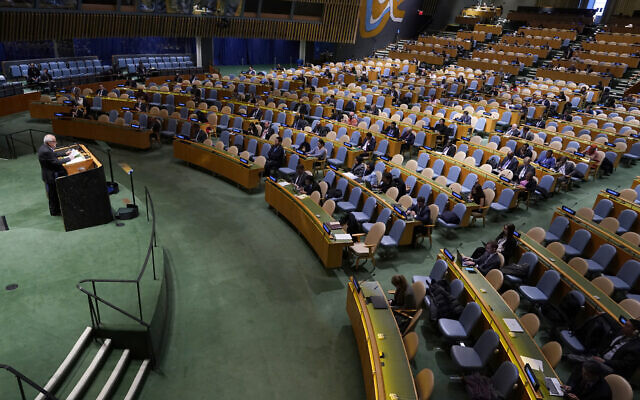





![Israeli tanks and APC’s gather by the Israeli – Lebanese border. Amid Israel’s escalating campaign against Hezbollah in Lebanon on September 30, 2024. [Erik Marmor/Getty Images]](https://en.minanews.net/wp-content/uploads/2024/10/IMG_20241001_203226-300x197.jpg)



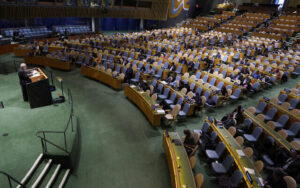
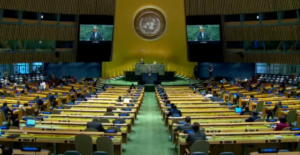
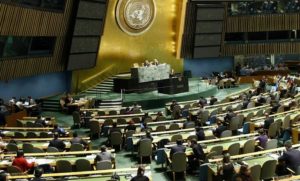
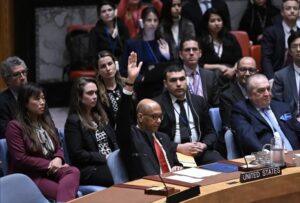
















 Mina Indonesia
Mina Indonesia Mina Arabic
Mina Arabic